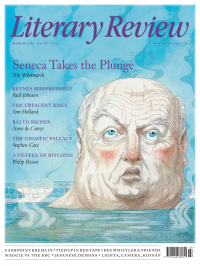Donald Rayfield
The Big Freeze
Putin’s Kleptocracy: Who Owns Russia?
By Karen Dawisha
Simon & Schuster 447pp $30
Red Notice: How I Became Putin’s No 1 Enemy
By Bill Browder
Bantam Press 367pp £18.99
If an international criminal court ever decides to throw the book at Vladimir Vladimirovich Putin, then Karen Dawisha’s Putin’s Kleptocracy is the book the prosecutor might want to read. Dawisha has followed up every trace of Putin’s activity since the KGB was officially dissolved and gives, with varying degrees of certainty and assurance, the dates, locations, associates and outcomes of some twenty years of criminal activity – hit-and-run car accidents, fraud, misappropriation of national and international funds, chicanery, grand larceny, false accusations, torture, murder, war crimes and terrorism. Many of these crimes have been revealed and discussed by previous authors (notably Yuri Felshtinsky in Blowing Up Russia: The Secret Plot to Bring Back KGB Power, co-authored with Alexander Litvinenko, and The Putin Corporation, and Masha Gessen in The Man without a Face: The Unlikely Rise of Vladimir Putin). Dawisha, however, has sacrificed narrative flow to build up a much more convincing indictment: over the years she has retrieved a vast archive of cached internet material (as ephemeral as mayflies in Russian cyberspace), from which this book is, in several senses, condensed. Fraud cases involving billions of dollars are notoriously difficult for laymen to follow, but Dawisha’s readers will find good reason to harness their powers of concentration. Felshtinsky and Gessen are more readable, but are too easily repudiated by pro-Putin spokesmen. Dawisha’s finely detailed and heavily annotated forensic dossier has to be studied with a lawyer’s patience, preferably together with the material on her website (www.miamioh.edu/havighurstcenter/putins-russia).
There is only one thing more shocking than the criminality of Putin’s Russia, the theft of the nation’s assets and the oppression of its people, including the sick, the poor and the intellectually bold: the acquiescence of the rest of the world. The British reader cannot at the time of

Sign Up to our newsletter
Receive free articles, highlights from the archive, news, details of prizes, and much more.@Lit_Review
Follow Literary Review on Twitter
Twitter Feed
Under its longest-serving editor, Graydon Carter, Vanity Fair was that rare thing – a New York society magazine that published serious journalism.
@PeterPeteryork looks at what Carter got right.
Peter York - Deluxe Editions
Peter York: Deluxe Editions - When the Going Was Good: An Editor’s Adventures During the Last Golden Age of Magazines by Graydon Carter
literaryreview.co.uk
Henry James returned to America in 1904 with three objectives: to see his brother William, to deliver a series of lectures on Balzac, and to gather material for a pair of books about modern America.
Peter Rose follows James out west.
Peter Rose - The Restless Analyst
Peter Rose: The Restless Analyst - Henry James Comes Home: Rediscovering America in the Gilded Age by Peter Brooks...
literaryreview.co.uk
Vladimir Putin served his apprenticeship in the KGB toward the end of the Cold War, a period during which Western societies were infiltrated by so-called 'illegals'.
Piers Brendon examines how the culture of Soviet spycraft shaped his thinking.
Piers Brendon - Tinker, Tailor, Sleeper, Troll
Piers Brendon: Tinker, Tailor, Sleeper, Troll - The Illegals: Russia’s Most Audacious Spies and the Plot to Infiltrate the West by Shaun Walker
literaryreview.co.uk